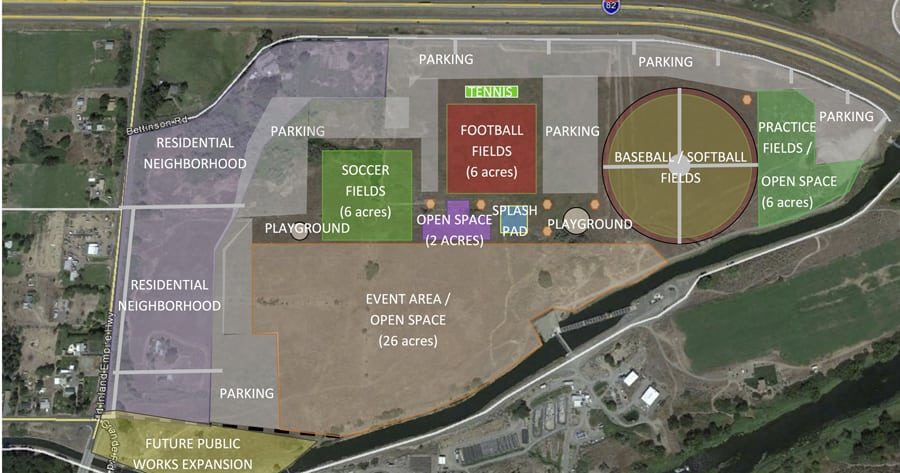
Home » Prosser aims to develop 80- to 90-acre sports complex by 2020
Prosser aims to develop 80- to 90-acre sports complex by 2020

November 15, 2017
City plans to parcel off 24 acres for residential development to pay for project’s first phase
By 2020, football, baseball, softball and soccer players will have new fields to play on as the city of Prosser moves toward its goal to create a sports complex.
“It’s been a long time coming,” said David Stockdale, Prosser city administrator. “I’ve been able to go back and look at records as far back as 1996 for the city wanting this.”
[blockquote quote="Overall, the entire project is estimated to be about $11 million." source="David Stockdale, Prosser city administrator" align="right" max_width="300px"]
Sports tournaments are prevalent in the Tri-Cities and Yakima, bringing in millions of dollars in tourism revenue. Visiting teams infuse money into restaurants, hotels, gas stations and retail stores. And with Prosser sitting almost squarely between the Lower Valley and Columbia Basin leagues, Stockdale believes it will be a draw in Eastern Washington.
“Whereas it might be difficult for the Tri-Cities to bring someone in as far away as Yakima, we’re right there in the middle and can bring both to an event. They have the population, but our location is really ideal,” he said. “We’ll draw as far south as Hermiston, as west as Yakima if not further, and as east as Tri-Cities if not Walla Walla. The numbers are quite telling.”
Yakima’s Sozo Sports Complex opened in 2016 and Stockdale said within its first year, the complex had more than a half million people visit the facility.
“And theirs is 40 acres. We’re going to be 80 to 90 acres—so almost twice as big,” he said, adding that the Prosser sports complex is also different in that it will include about 20 acres for events such as concerts, festivals and weddings.
Prosser’s sports complex will be built just south of Interstate 82 on city-owned property between Bettinson Road and Chandler Canal. The property encompasses 116 acres, but the city will parcel off about 24 acres on the west end for residential construction. Revenue from this sale will help pay for the first phase of development, which includes the sports fields, general open space, power, restrooms, access and parking.
“We expect about 100 homes to be built. Typically, residential lots are selling for about $20,000 to $30,000 an acre. We estimate somewhere between $500,000 and $650,000 in revenue,” he said. “We’re going to get the property ready and put it up for auction and let developers do what they do. That’s slated for 2019.”
The first phase of construction on the sports complex is estimated to cost about $6 million to $8 million, while the second phase is expected to run about
$3 million and would add playgrounds, a splash park, pavilions and tennis courts.
“Overall, the entire project is estimated to be about $11 million,” Stockdale said. “We’ll get better numbers in the next five to six months as we zero in on everything we need.”
Once state legislators adopt a capital budget, the city will apply for a design grant with the Recreational and Conservation Office, or RCO. The grant cycle opens every two years, and if Prosser receives the money, it would receive notification by June or July 2018.
“We’re talking about $500,000 in each round of (RCO grant) funding. And we’ll do it again in 2020,” he explained. “We’ll apply for the grant, and if it’s not funded, Plan B would be to explore more funding opportunities in the community.”
Stockdale said the city also plans to apply for U.S. Department of Agriculture Rural Development grants.
“We’ll take a look at that, and we also have funds from the rural county capital funds. Those funds are earmarked for projects that can help the economy in job growth and economic development,” he said.
Money also will be raised by approaching businesses and individuals who might be interested in sponsorship rights, such as having a namesake field.
“It’s not an easy task. Most likely, it’s going to be a combination of community support, city dollars, grant dollars, and if we need more, we’ll look at bonds,” he said, adding the city plans to reach out to the community for in-kind work for the complex to be built in the most cost effective way.
“These sorts of facilities enhance your sense of community,” he said. “And this project is going to take a community effort to be built.”
Once it’s completed, the sports complex is expected to bring in more than just tourism dollars. Stockdale said at the very least, it will create more jobs in the fields of tourism and promotion.
“And I suspect most likely jobs for the city in our recreation program and maintenance. I do think it will also bring in more for the supporting businesses: hotels, restaurants,” he said, adding, “and definitely jobs in the event industry.”
Festivals, holiday showcases, concerts and weddings can be just as big of a draw as sports-related events. And one of the things Prosser is looking at is the ability to have a diverse venue where a stage can be set up anywhere in the 20-acres of open space carved out in the design plans.
“We’re saying, ‘Here’s the event area—20 plus acres—and you tell us where you want to set up the stage,’ and we’ll have three or four sewer connections and power connections for vendors. Nowadays a lot of these artists that come to festivals, they want diversity,” he said. “If you have your stage limited to being in one spot only, it doesn’t allow for growth. We’ll be as dynamic as you are.”
After the city council makes its final recommendations, Stockdale said it will move from a regional task force to a specialized committees with representatives from the local soccer, baseball, softball, football and event industries. Hotel and restaurant owners also will be approached for input.
“They’ll have their own steering committees—people in their fields of expertise,” he said. “And we’ll talk about access and parking lot and hours. Without a doubt there’ll be community participation.”
Real Estate & Construction Local News
KEYWORDS november 2017





